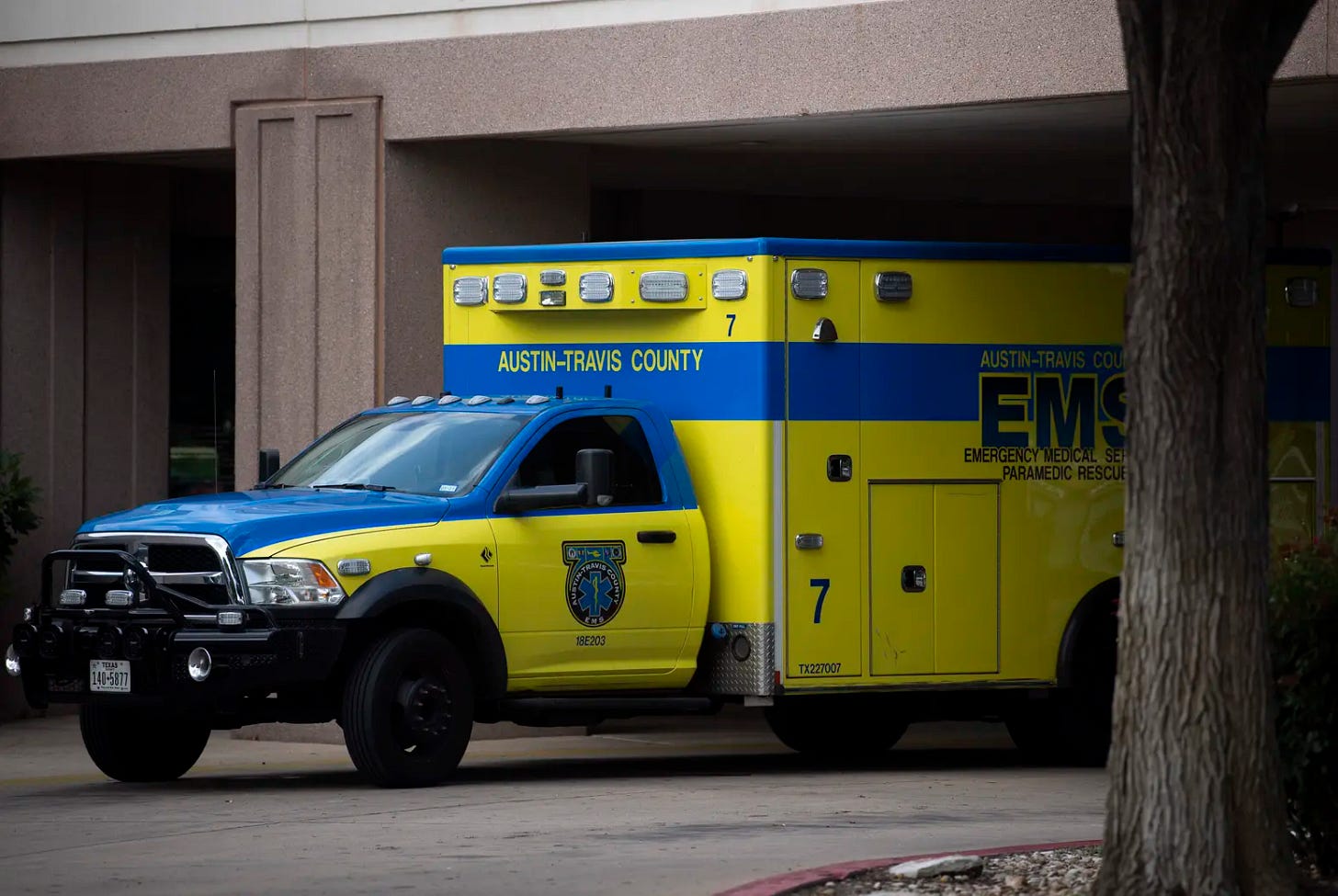Travis County Combats Fentanyl Crisis with Narcan Amid Soaring Overdose Deaths
A summary of the top news from the U.S. - Mexico border
An Austin-Travis County EMS vehicle parked outside of St. Davidís North Austin Medical Center on July 7, 2020. Credit: Allie Goulding/The Texas Tribune
Travis County is shifting focus to prevent overdose deaths as fentanyl ravages the area
Stephen Simpson, The Texas Tribune.- Travis County is grappling with a dramatic rise in drug-related deaths, with fentanyl at the forefront. Since 2019, accidental drug deaths in the county have tripled, surpassing other urban Texas counties in overdose fatalities. In response, local authorities have intensified their efforts by distributing Narcan and enhancing public education on overdose prevention. The surge in fentanyl-related incidents has prompted a statewide awareness campaign and stricter legal measures against fentanyl distribution. Despite these efforts, the need for expanded mental health and substance abuse services remains a pressing issue in combating the ongoing drug epidemic.
San Diego Sector Sees Surge in Illegal Crossings as Migrants Shift West
Alexandra Mendoza, San Diego Tribune.- San Diego County has emerged as the busiest spot for illegal border crossings into the U.S., overtaking traditional hotspots in Arizona and Texas. Last month, the U.S. Border Patrol reported a 49% increase in encounters in San Diego, totaling 37,370. This shift is primarily attributed to Texas’ intensified border security measures, which have redirected migrant flows to California. Migrants and humanitarian aid organizations indicate a perception that crossing in San Diego poses fewer risks. Despite this, the federal and local governments continue to struggle with the increased numbers, impacting local resources and the provision of humanitarian aid.
Federal Judge Halts ICE’s ‘Knock and Talk’ Arrests in Southern California
Andrea Castillo Los Angeles Times.- A federal judge in Los Angeles has declared the "knock and talk" arrest tactic used by ICE unconstitutional, mandating its cessation in Southern California. This method, which involves agents entering personal property without a judicial warrant, has been criticized for infringing on immigrants' rights to privacy in their homes. Advocacy groups, recognizing the ruling as a significant victory for immigrants' safety and justice, have long condemned the practice for its deceptive approach and psychological impact on immigrant communities. The decision, resulting from a class-action lawsuit filed by local immigrant rights organizations, specifically restricts ICE's Los Angeles field office, impacting several counties, including Los Angeles, Orange, and San Bernardino.
Rudy Giuliani Served Indictment in Arizona Elector Case
Elena Santa Cruz and Ronald J. Hansen, Arizona Republic.-: Rudy Giuliani was served with a court summons in Florida during his birthday celebration, marking his formal involvement in Arizona’s fake electors case linked to the 2020 election. Despite efforts in New York, agents successfully served him after tracking him to a party. Giuliani’s name was confidential in the indictment until it was served. He faces charges along with 17 others for attempting to overturn election results. Attorney General Kris Mayes emphasized that no one is above the law, countering Giuliani’s earlier taunts about evading service. The indictment details Giuliani’s actions post-election, including spreading misinformation and pressuring officials. He is due in court for arraignment, potentially setting the stage for a high-profile legal battle.
Asylum Seekers Face Lawyer Shortage, Risking Deportation
Edgar Sandoval, The New York Times.- Jander Durán and his family fled Colombia due to guerrilla threats, seeking asylum in the U.S. Overwhelmed by the complex legal process and unable to afford their lawyer's fees, they represent many migrants facing similar challenges. With a significant increase in asylum seekers and a severe shortage of immigration lawyers, many legitimate asylum cases are at risk. Only about 30% of migrants find legal representation, drastically reducing their chances of successfully claiming asylum. The U.S. immigration system's backlog has soared, further complicating the plight of migrants like the Duráns, who struggle to navigate the daunting legal landscape without adequate support.



